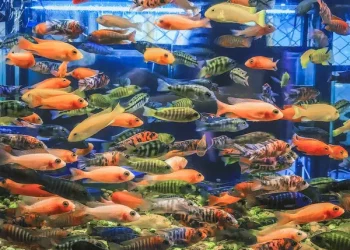Lungfish are remarkable fish that are known for their ability to breathe air through primitive lungs. This adaptation allows them to survive in environments that would be hostile to other fish, such as stagnant or low-oxygen water. But what happens if a lungfish doesn’t get air? In this article, we will explore the consequences of oxygen deprivation for these fascinating creatures.
First, it’s important to understand how lungfish breathe. Like other fish, they extract oxygen from the water through their gills. However, they can also breathe air through their lungs, which are primitive structures that evolved from the swim bladder. Lungfish have a unique mechanism for breathing air, which involves gulping air at the surface and then using their buccal (mouth) and opercular (gill) pumps to circulate the air through their lungs.
If a lungfish is deprived of air, several things can happen. The most immediate consequence is that the fish will begin to suffocate. Without access to oxygen, the cells in its body will begin to die, and it will eventually perish. However, the speed at which this happens will depend on the circumstances.
If a lungfish is in a low-oxygen environment, it may be able to survive for some time without breathing air. For example, if the water is stagnant and depleted of oxygen, the lungfish may be able to extract enough oxygen from the water through its gills to survive. However, this will be a stressful and uncomfortable situation for the fish, and it may become weakened or vulnerable to disease as a result.
If a lungfish is in an environment where there is plenty of oxygen available but it is unable to access the air, such as if it is trapped under ice, it may be able to survive for a short time by using its gills alone. However, this will not be sustainable in the long term, and the fish will eventually run out of oxygen.
In general, lungfish are adapted to survive in environments where there is a variable or unpredictable supply of oxygen. This means that they are relatively resilient to oxygen deprivation, at least in the short term. However, if a lungfish is deprived of air for an extended period of time, it will inevitably suffer the consequences, including suffocation and death.
In conclusion, a lungfish that doesn’t get air will begin to suffocate and eventually perish. However, the speed at which this happens will depend on the circumstances. Lungfish are adapted to survive in environments where there is a variable or unpredictable supply of oxygen, but prolonged oxygen deprivation will inevitably have negative consequences for these fascinating creatures.

























